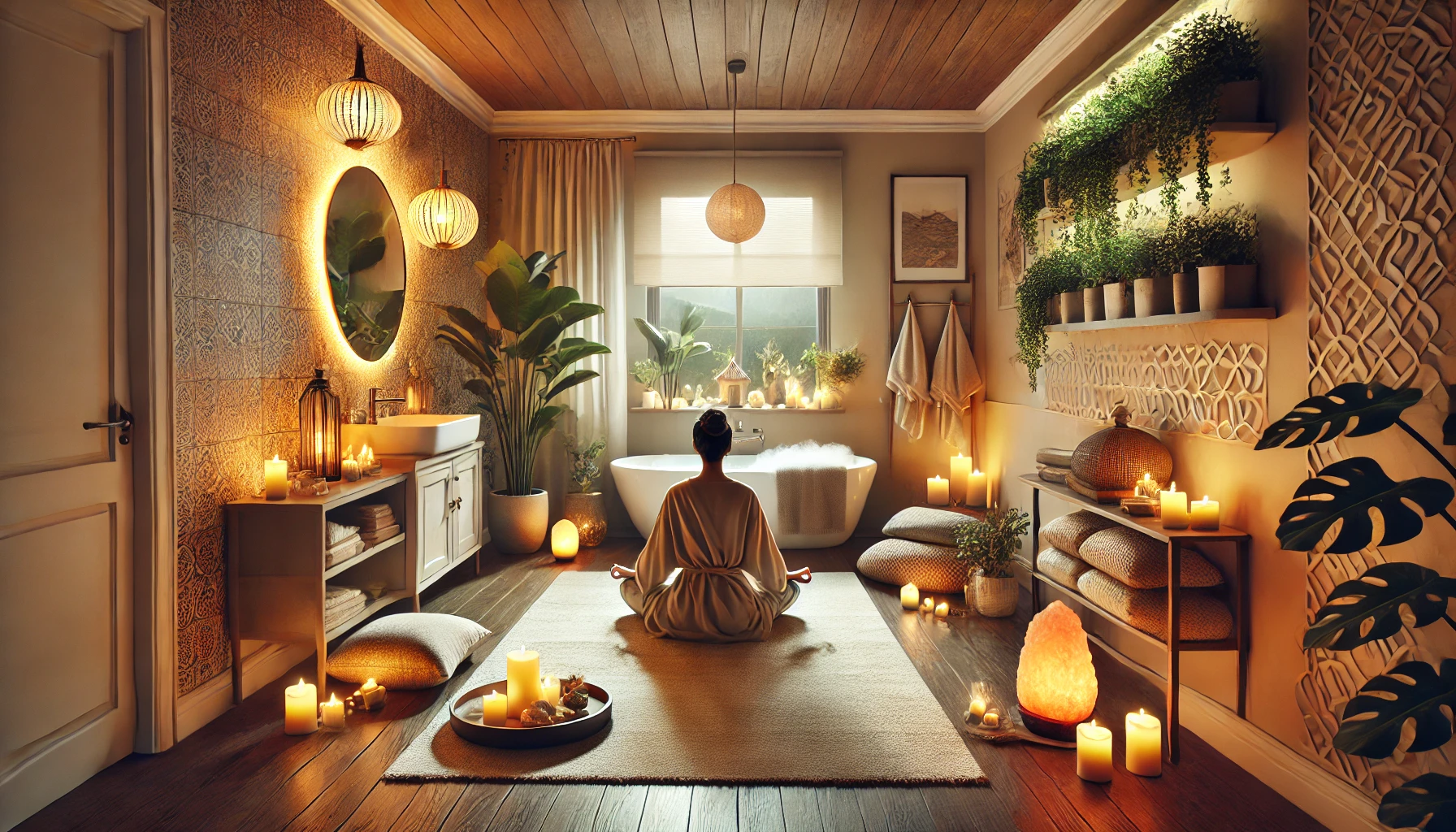How to Use Feng Shui to Support Self-Care and Personal Well-Being in Your Home
A home designed for self-care and well-being creates an environment that nurtures relaxation, mindfulness, and personal growth. Feng Shui principles can help balance energy, promote inner peace, and cultivate a space that supports self-care rituals. By incorporating calming colors, optimizing relaxation areas, and using elements that encourage mindfulness, you can transform your home into a sanctuary for self-care and well-being.
1. Activate the Self-Care and Well-Being Area (Center of the Home)
The center of the home represents balance and overall well-being. Strengthening this area fosters emotional, physical, and mental harmony.
- Keep the center of your home uncluttered, allowing energy to circulate freely
- Use earth elements, such as stone, ceramic, or wooden decor, reinforcing stability and mindfulness
- Decorate with warm, soft colors, promoting emotional grounding and relaxation
- Add a small water fountain or Himalayan salt lamp, enhancing soothing energy
2. Declutter to Create a Calm and Stress-Free Environment
A cluttered home can contribute to stress and mental fatigue.
- Remove unused or broken items, allowing space for fresh, positive energy
- Keep self-care spaces (bathroom, bedroom, meditation area) organized and inviting
- Store personal items neatly, ensuring a sense of control and peace
- Regularly refresh your space by rearranging decor, deep cleaning, or adding new self-care elements
3. Use Calming Colors to Support Relaxation and Mindfulness
Colors influence emotions and can enhance self-care practices.
- Soft blues and greens – Promote relaxation, peace, and emotional healing
- Warm neutrals (beige, light brown, soft yellow) – Reinforce stability and grounding
- Lavender and pastel pinks – Encourage self-love, self-care, and inner calm
- Avoid overly bright or dark tones, which can overstimulate or drain energy
4. Arrange Furniture for Comfort and Restorative Energy
The way furniture is positioned affects relaxation and self-care routines.
- Arrange seating areas to promote ease and openness, avoiding cluttered layouts
- Keep walkways and personal spaces clear, allowing energy to flow freely
- Use rounded furniture and soft textures, reducing sharp, harsh energy
- Ensure that bedrooms, bathrooms, and meditation areas feel private and peaceful
5. Incorporate Natural Elements to Enhance Well-Being
Nature-based decor fosters a sense of calm and restoration.
- Add indoor plants, such as aloe vera, lavender, or bamboo, purifying the air and reducing stress
- Use wooden furniture and soft natural fabrics, reinforcing warmth and comfort
- Incorporate a small indoor fountain or essential oil diffuser, promoting relaxation
- Display nature-inspired artwork, such as serene landscapes or floral imagery, reinforcing tranquility
6. Optimize Lighting for a Peaceful and Nurturing Atmosphere
Proper lighting plays a key role in self-care and relaxation.
- Maximize natural light, keeping curtains open during the day
- Use warm, dimmable lighting in self-care areas, creating a cozy atmosphere
- Install candles, soft lamps, or fairy lights, adding warmth and positivity
- Avoid harsh fluorescent lighting, which can create stress and discomfort
7. Introduce Sound and Music to Support Mindfulness and Self-Reflection
Sound influences emotions and mindfulness practices.
- Play calming instrumental music, nature sounds, or meditation tracks, promoting peace
- Use wind chimes near doors or windows, ensuring a gentle, relaxing energy flow
- Incorporate a small singing bowl or meditation bell, clearing stagnant energy and encouraging self-reflection
- Minimize loud or disruptive noises by using rugs, curtains, or noise-reducing materials
8. Use Aromatherapy to Enhance Relaxation and Self-Care Rituals
Scents can positively affect mood and support relaxation.
- Diffuse lavender, chamomile, or sandalwood essential oils, promoting relaxation and stress relief
- Use rose or vanilla scents, encouraging self-love and comfort
- Keep fresh flowers or herbal sachets in self-care areas, reinforcing a soothing atmosphere
- Avoid strong artificial fragrances, opting for natural, organic scents
9. Create a Self-Care Sanctuary for Daily Relaxation
A dedicated space for self-care enhances mindfulness and well-being.
- Set up a cozy reading nook, meditation corner, or journaling space, providing a personal retreat
- Keep a gratitude journal or self-care checklist nearby, encouraging daily reflection
- Display symbols of peace and self-care, such as healing crystals, affirmations, or meaningful decor
- Use soft blankets, pillows, and comfortable seating, making the space inviting and rejuvenating
10. Design a Spa-Like Bathroom for Ultimate Relaxation
A well-designed bathroom can serve as a private retreat for self-care rituals.
- Keep the bathroom clean, organized, and free of clutter, promoting relaxation
- Use soft towels, bath salts, and essential oils, enhancing the spa-like experience
- Install candles or warm lighting, creating a calming environment
- Avoid placing mirrors directly facing the shower or bathtub, keeping energy restful
11. Maintain a Healthy and Restful Bedroom
A well-balanced bedroom supports emotional well-being and deep sleep.
- Position the bed against a solid wall, reinforcing security and comfort
- Use plush bedding in calming colors, creating a peaceful sleep environment
- Keep electronics out of the bedroom, reducing mental stimulation before rest
- Avoid placing mirrors facing the bed, which can create restlessness
12. Refresh and Maintain a Healing Energy Flow
Keeping energy fresh ensures ongoing relaxation and emotional balance.
- Smudge with sage, palo santo, or incense, removing stagnant energy
- Open windows frequently, allowing fresh air and positive Chi to enter
- Keep a bowl of sea salt in common areas, absorbing negativity
- Rearrange decor, plants, or self-care elements periodically, keeping energy dynamic and inspiring
Final Thoughts: Creating a Feng Shui Home for Self-Care and Personal Well-Being
By applying Feng Shui principles, you can design a home that nurtures relaxation, self-care, and emotional balance. A clutter-free, well-lit, and thoughtfully arranged space fosters mindfulness and well-being.
A home filled with calming energy encourages self-care, inner peace, and rejuvenation. With mindful design choices and daily self-care rituals, you can cultivate an environment where personal well-being naturally thrives.
